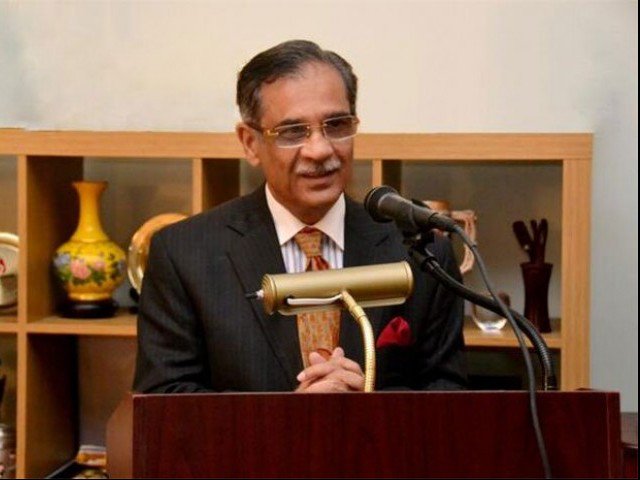
The three-judge bench of the Supreme Court, headed by the CJP Nisar on Friday issued notices to the attorney general for Pakistan (AGP), the Pakistan Bar Council (PBC) and the Supreme Court Bar Association (SCBA) to assist in determining scope of exercising suo motu jurisdiction under Article 184 (3) of the Constitution. Two senior lawyers will also be appointed as amicus to assist in this matter.
During the hearing, the CJP told the AGP Anwar Mansoor Khan that the court wants to examine whether it is overstepping its jurisdiction under Article 184 (3 ) of the Constitution, which allows it to intervene in public interest matters. "We want to regularise our powers," he noted before adjourning the case for an indefinite period.
After the Friday's hearing, the PBC executive member Raheel Kamran Sheikh wrote a letter to the PBC executive committee to hold a meeting for demanding formation of full-court to hear the matter.
In his letter, Sheikh said it is nothing short of a surprise to see that the CJP, who has 'thoroughly enjoyed' the exercise of power during his tenure and expanded its scope to 'unprecedented degrees', undertakes such an exercise at this juncture when he is about to retire in four months' time.
Suo motu notices taken to ensure provision of rights to people: CJP
"Be that as it may, it is never too late to regulate such a power that carries with it the potential to distort, paralyse or even takeover other systems in the society. Be it judicialisation of politics or economics or art and culture, bar must play its due role to safeguard against such unwarranted interventions.
"At the same time, while regulating exercise of one of the most important jurisdictions under Article 184, unnecessary restrictions that may make the Supreme Court toothless against other organs of the state and society in respect of blatant violations of the fundamental rights, oppressions and injustices, must be equally unacceptable," he stated.
The letter said given the importance and sensitivity of such an exercise, the bar should demand hearing of this case by the full-court and in this regard the position to be taken in the court by this apex bar should be discussed and resolved before hand at the earliest.
"Certainty lies at the heart of rule of law and a full-court hearing will ensure certainty of some degree in the future of judicial policy vis-a-vis Article 184 of the Constitution to which contribution may be made by all judges of the Supreme Court including the future CJPs to serve till 2030," he said.
After the lawyers' movement, the overuse or misuse of suo motu powers has been widely criticised by the superior bars and major political parties except for the ruling Pakistan Tehreek-e- Insaf (PTI).
Both the Pakistan Muslim League-Nawaz (PML-N) and the Pakistan Peoples Party (PPP) faced tough time due to use of suo motu powers by the apex court and a numbers of politicians faced disqualification.
Suo motu powers should be exercised in public interest matters but politicians have been its victim. The Article 225 says no election dispute can be called in question except election petition but dozens of lawmakers have been disqualified while exercising jurisdiction of quo warranto under Article 184 (3).
Interestingly, there is no option of filing appeal against the judgement in a suo motu case. However, Law Minister Farogh Naseem has expressed full satisfaction over the use of suo motu powers by the judiciary. He is also not in favour to give option of right of appeal against the rulings in such matters.
The PPP's latest manifesto also stated that Article 184(3) has been used in ways that "did not inspire great confidence in its use by courts in human rights issues."
Recently, an SC judge Justice Qazi Faez Isa also put a question mark over the manner in which public interest litigations were initiated by the Human Rights Cell of the top court.
In a three-page note, the judge said constitutional powers granted to the SC could not be assumed by the Human Rights Cell director, adding that the CJP's approval was also not a substitute for an SC order.
According to Justice Isa, before exercising its original jurisdiction, the apex court should satisfy itself that the jurisdiction it is assuming is in line with the Constitution. The CJP is himself supervising the Supreme Court Human Rights Cell where hundreds of applications are received daily.

1729161093-0/liam-(4)1729161093-0-165x106.webp)


1732603002-0/lamar-(4)1732603002-0-165x106.webp)
1732604291-0/BeFunk_§_]__-(52)1732604291-0.jpg)

1732606500-0/BeFunk_§_]__-(53)1732606500-0.jpg)


1732607286-0/Untitled-design-(2)1732607286-0-270x192.webp)






COMMENTS
Comments are moderated and generally will be posted if they are on-topic and not abusive.
For more information, please see our Comments FAQ